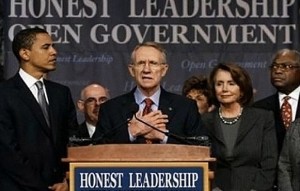 Every day brings new examples of the intellectual deficiencies of people in leadership positions. Consider these examples. The U.S. Senate ignoring its obligation to create an annual budget for over three years (and counting). Congress pressuring banks to make highly risky loans and then blaming the banks when the inevitable financial disaster occurs. Congress and the President attempting to solve the nation’s debt crisis by increasing the debt. A former House Speaker arguing that the massive health care bill be passed before knowing what is in it.
Every day brings new examples of the intellectual deficiencies of people in leadership positions. Consider these examples. The U.S. Senate ignoring its obligation to create an annual budget for over three years (and counting). Congress pressuring banks to make highly risky loans and then blaming the banks when the inevitable financial disaster occurs. Congress and the President attempting to solve the nation’s debt crisis by increasing the debt. A former House Speaker arguing that the massive health care bill be passed before knowing what is in it.
The list goes on. Justice department officials refusing to prosecute people who threaten voters outside polling places but then arguing that requiring identification cards is a threat to the election process. (This despite the fact that showing ID is standard practice when cashing a check, buying beer, or boarding a plane.) New York City’s mayor banning sugar, salt, and large soft drinks in his city and restricting the distribution of baby formula to mothers. Other mayors refusing to allow a restaurant chain to build new restaurants merely because its founder disapproves of gay marriage.
Examples of such absurdity are not confined to government. Many Catholic bishops ignore the distinction between legal and illegal immigration and castigate people who want the border secured. Many education leaders claim that the mention of God in school imposes religious values but deny that presenting the modern equivalent of the Kama Sutra imposes secular values.
How do people so bereft of sound thinking and common sense rise to leadership positions in the first place? And why does their number seem to be increasing dramatically?
The ascendancy of mediocre and even incompetent people is not a recent development. Cultivating one’s superiors has always been a sure path to success, often surer than possessing intellectual skills. The story is told of the teacher that urged students to be independent thinkers who investigate and evaluate issues on their own. One student who was averse to effort decided on a shortcut: he listened carefully when the teacher spoke about issues, identified the teacher’s point of view, and then repeated that view in his essays and exams. The approach paid off—time and again the teacher praised the student for “Great insight,” “Impeccable logic,” and “Good thinking.”
The lesson that student learned about success is repeated in many classrooms. All of us, including teachers, tend to see people who agree with us as more intelligent than those who disagree. Even if we understand that this perception is driven by ego, the good feeling it offers can override our understanding. People who agree with us bolster our confidence and make us feel comfortable; people who disagree threaten our sense of security and therefore seem quarrelsome and obnoxious even when they are not. (Granted, some are obnoxious and that makes the broader stereotype seem all the more justified.)
Children who learn to cultivate their superiors and never ask provocative questions or challenge ideas tend to get better grades than their talent alone would warrant. They also tend to get better recommendations from school officials, attend more prestigious colleges, develop more useful contacts and connections, and for all these reasons enjoy special advantages in their careers. It shouldn’t be this way, of course. And it wouldn’t be if the schools valued good thinking enough to actually teach the skills of problem solving and decision making in every course and reward students for practicing those skills, rather than for apple polishing. But we’re talking about what is, not what should be.
Exactly what special career advantages do those who cultivate their superiors enjoy? They often start higher on the employment ladder than their peers and are generally placed on a faster promotion-track. And the more they refine their strategy of pleasing the right people, the faster they rise. In virtually no time they may hold positions such as assistant to the company vice-president, or associate dean of the college, or personal secretary to the bishop, or assistant chairman of the state political party. The associations developed in these positions ensure even further and faster advancement.
And that is the process by which many company executives, college administrators, bishops, and elected officials get their jobs. Note the word many. Of course, some of the people in those positions have achieved them through demonstrated excellence in problem solving and decision making, and thank goodness for that. But our focus, remember, is on the ones who lack sound thinking and common sense and therefore perform less competently.
The fact that the process has continued for decades and even centuries explains why some of today’s leaders are incompetent. But why has the number increased to the point where they arguably threaten the future of our society? Because modern culture has devalued competency.
Traditionally the home, school, church, and the general culture agreed upon certain fundamental ideas, notably these: excellence is not inborn but must be achieved; truth is discovered rather than created; each of us has much to learn from others; feelings can be noble or ignoble and reason helps us tell the difference; self-esteem follows achievement; and humility is the best path to personal growth.
In the 1960s all of those ideas came under attack. It became fashionable to believe that everyone is born wise and good and therefore truth and reality are created and both exist within the individual. Further, that because truth and reality are intensely personal, learning from other people is not necessary; feelings are more reliable than reason; self-esteem must be present before one can achieve; and humility (which is believed to undermine self-esteem) should be avoided.
Today’s leaders have been exposed to, and in many cases formally taught, these fashionable ideas. It is therefore not surprising that they have embraced them and that their words and deeds reflect them. In other words, their incompetence, where it exists, can often be directly be traced to these fashionable ideas and the attitudes they inspire. Let me be more specific:
- Having been told they were born wise and wonderful, many leaders approach daily challenges with an attitude of omniscience and infallibility.
- Having been told that they create their own truth and reality, many leaders classify their opinions as indisputably true. Whatever opposes those ideas they regard as false.
- Because they already know what is true and real, they tend to have little curiosity about, or interest in, other people’s ideas.
- Having been told that feelings are more reliable than reason, they trust their impressions and hunches implicitly, make no allowance for misunderstanding or misperception, and see no point in verifying their impressions.
- Having been told that self-doubt and self-criticism undermine their self-esteem, many leaders refuse to review and reconsider their thoughts, words, and deeds. Moreover, to avoid the temptation they might in some cases be—gasp!—wrong, they try to associate only with people who share their views and avoid those who do not.
- When avoidance fails and circumstances force them to deal with people who disagree with their views, for example in a debate, such leaders seldom respond well. Having formed their opinions solely on the basis of feelings, when asked to support those opinions with evidence, they have nothing to offer. So they resort to what logicians call ad hominem argument, also known as demonizing one’s opponent.
- When such leaders are urged by their followers or constituencies to be more cooperative work out fair compromises, they tend to delude themselves into believing that, since they are wise and wonderful, the cooperation and compromise should come from their opponents. The sad result, of course, is that nothing changes.
Generally speaking, the higher the person’s office, the greater the tendency to form these arrogant habits and attitudes. This is understandable. Elected officials can view their electoral success as confirmation of their excellence; educators can regard their positions in the front of the classroom (not to mention their degrees) as proof of their superiority. Bishops can regard their elevation as divine affirmation of their intellectual and moral merit.
The leaders who display the arrogance described here exemplify the delusion country singer Mac Davis satirized in his song about how hard it is to be humble when you are already “perfect in every way.” The sooner they are replaced, the better.
Copyright © 2012 by Vincent Ryan Ruggiero. All rights reserved



